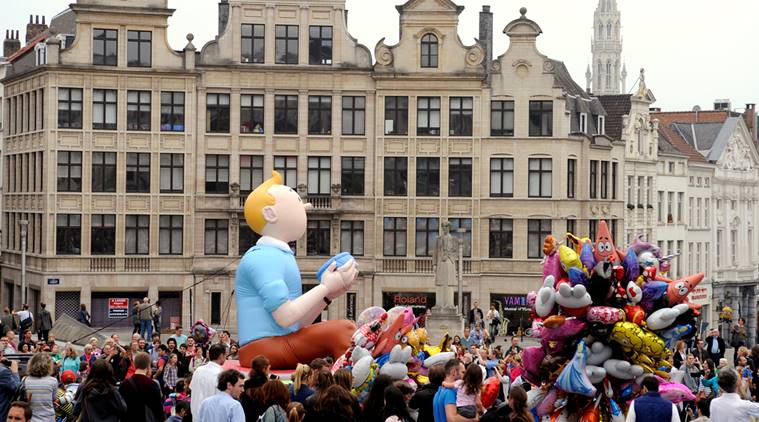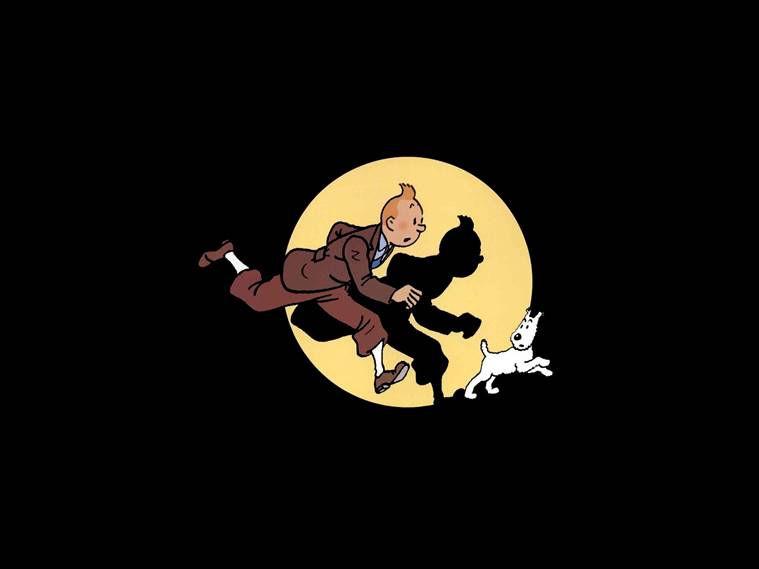What made Tintin the ultimate fantasy for generations and his greatest gift to us
It’s inevitable that Tintin at 90 will show his wrinkles and warts. But the boy-man always ready to take off on an adventure remains a dream of ageless freedom and undying friendship.
 Enter the hero: A Tintin balloon float during a parade in Brussels in 2014.
Enter the hero: A Tintin balloon float during a parade in Brussels in 2014.
“He looks just like Rastapopoulos,” I giggled. As our boat glided down the muddy river in Borneo, the proboscis monkey sitting up on the trees, having a snack, stared down at us.
It was like a Tintin drawing come to life, bulbous nose, potbelly and all. Flight 714 to Sydney (1966) to be precise. Any moment I expected somebody on our boat to say “My, what a sight. What a conk!… Did you ever see such a conk? Reminds me of someone…”
The monkey eventually got tired of our goggle-eyed curiosity. But he was not budging. Instead, in a huff, he took a large leaf and drew it over his face like a curtain. Show over, folks. Keep moving.
But we were thrilled. We had seen a proboscis monkey in the wild. Just like in the adventures of Tintin. But in real life, a male proboscis monkey has a shocking red penis, sticking up like a candle, which he tugs absent-mindedly, giving him the air of a middle-aged potbellied pervert, the flasher exposing himself to the unwitting passers-by. In Hergé’s drawings, the monkeys were more discreet, all nose and no genitalia.
That was the allure of Tintin for us, growing up in Kolkata. It was clean-cut, desexualised and wholesome, yet not boring. That made it the ultimate fantasy for generations of timid Bengali teenagers. Tintin was such a good boy, the kind any Bengali mother would love. He always dressed soberly in that white shirt, blue sweater and brown pants. He was polite, knowledgeable and sincere. He had no discernible vices. Yet, he was an adventurer looking for Red Rackham’s treasure, rocketing up to the moon, meeting the abominable snowman. In all those comics, we never encountered Tintin’s family. No mother wanting to know if he would be home for dinner. No father asking him about a stable job with good career prospects. No aunties ribbing him about girlfriends or lack thereof. Tintin was a good boy without an umbilical cord tying him down to responsibility and obligation. He was responsible only to 62 pages of adventure, no more and no less.
Of course, we read Tintin without any context at all. He airdropped into our lives, perfectly formed. It was a while before I even realised his Belgian origin, that in the original French, Snowy the dog was Milou just as in Bengali he was Kuttush; I didn’t know his name meant “nothing” in French, a typographic vanishing point. We had no idea that Tintin’s creator, Georges Remi aka Hergé, worked as an illustrator and an editor for a right-wing, anti-Semitic and staunchly Catholic newspaper. Hergé wanted to send Tintin to America but his boss made him send him to the land of the Soviets to peddle anti-socialist propaganda to young children. Next, he went to the Congo where he was the poster boy of European enlightenment, bringing all the benefits of colonisation to the good-hearted but lazy natives even as he shot antelope, killed an ape and injured an elephant. The African bows and says “White man very great. White mister is big juju man.” None of it raised eyebrows in 1931.
But times have changed. When a Belgian minister in 2004 described Joseph Kabila’s government in the Democratic Republic of Congo as incompetent, a Congolese minister retorted it was racist colonial nostalgia, “Tintin in the Congo all over again.” In 2007, the Brooklyn Public library in New York put that 1930 comic in a locked vault-like room. You needed access to a comic book by appointment. Hitler’s Mein Kampf (1925) remained on the shelf.
Hergé did evolve with the times. The books became more sophisticated. It’s worth remembering Tintin walked on the moon 15 years before Neil Armstrong and the details were not half-bad. Tintin, the hunter of the Congo, befriended elephants in The Cigars of the Pharaoh (1932). Tintin, the poster boy for anti-Communist propaganda in the Land of The Soviets (1930), sported a CND symbol and helped leftist guerrillas in Tintin and the Picaros (1975), the final completed book, but only on the condition of non-violence.
Hergé met Zhang Chongren, a student at the Academie Royale, who helped him research 1930s China before he wrote The Blue Lotus (1934). The man, who had put imperialism in soft focus in the Congo, criticised the Japanese occupation of China. The original pidgin patois of the Congolese became a more respectable French. The Shooting Star led to complaints about anti-Semitism because of two Jewish debtors and an American financier named Blumenstein. Eventually, the debtors were removed and Blumenstein became a more ethnically vague Bohlwinkel. The abominable Snowman is more misunderstood than abominable.
Hergé had to fend off charges of sexism because the only real female character in the all-boys club of Tintin was the obliviously self-absorbed Bianca Castafiore. Even Snowy is a boy. In 2017, a French philosopher said the whole series was a giant con. Tintin is really a girl and probably asexual. Tintin, he said, dealt with a drunk Captain Haddock, just as Hergé would have imagined a woman should. Tintin disguised herself as a boy so she could travel more easily “without the fear of misogyny of other cultures, modesty, manners or the stupidity of prejudices”. When Tintin turned 80, a newspaper columnist claimed he was obviously gay, “a callow, androgynous blonde-quiffed youth in funny trousers and scarf, moving to the country mansion of his best friend, a middle-aged sailor”. It’s the studied asexuality of gay men in a time before gay liberation, all presided over by an all-knowing but utterly discreet Man Friday like Nestor, the butler. And here’s the clincher, a precious stereotype past compare, their only female friend is a full-blown opera diva, the ultimate fag hag accessory. But if it was indeed all gay code, it was a gay utopia where gay men of all ages lived, partied and adventured together happily, unlike the modern gay world with its strict age filters for uncles and twinks.
Don’t sexualise Tintin, said scandalised fans. Studios Hergé retorted he was “very macho”, just with many friends who are boys, but not boyfriends. Actually, in hindsight, it does not really matter. Childhood icons, imbued as they are with the prejudices and stereotypes of their time, rarely age well. It’s no surprise that generations to come will find shades of dubious grey in the ligne claire or clear line drawing of Hergé. It’s inevitable that Tintin at 90 will show his wrinkles and warts.
Sometimes I wonder what would happen if Tintin were still around. What would he make of the world around us? What kind of blistering epithet would Captain Haddock come up with for Donald Trump? Would there be an “Adventure of Tintin at Trump’s Wall”? Could Thomson and Thompson bumble around Twitter? What could Professor Calculus mishear when all our communication moves to mobile phones? Would Tintin finally make it to India beyond that brief stopover in Delhi en route to Kathmandu or the ludicrous Indiana Jones style crashlanding in the jungles of the kingdom of Gaipajama? Perhaps, he would trip over political minefields, his crashlanding being read as commentary on gaurakshaks.
 Tintin was about adventure in a time where not much happened in our lives.
Tintin was about adventure in a time where not much happened in our lives.
But it was never about the politics, not at all. Most of all, with the hindsight of middle age, I understand Tintin’s greatest gift to us was loyalty, unshakeable and unflinching loyalty. If Snowy was loyal to Tintin, Tintin was loyal to everyone else, to grouchy, salty, alcoholic Captain Haddock, to the befuddled Professor Calculus, to the clueless, bumbling Thompson and Thomson. But also to young prankster Abdullah. And, of course, to Chang, the orphan he saves from drowning. For those wanting to turn Tintin gay, Chang and Tintin’s long-distance bromance was like Veeru and Jai go to Brokeback Mountain. Their bond was so deep, every time they met and separate, they dissolved into tears. Which one of us didn’t dream of a friendship as pure as that? Which of us would not crave such deep loyalty in a time of Facebook likes?
Tintin was about adventure in a time where not much happened in our lives. Lying on a Kolkata terrace on a stifling summer night, we could see the stars and dream of Tintin pursuing the shooting star. We could see the moon and imagine ourselves as explorers on the moon. We could draw ourselves into his expeditions. He was our escape route, a boy-man always ready to take off on an adventure, no baggage, no family, no obligations. He had a job apparently as a reporter but a job with no office, no deadlines. He didn’t have to call in stories, write blogs on the side or tweet out teasers. He was allowed to be curious while we were taught to be obedient. He was unencumbered in a way none of us would ever be.
We knew that and that is why our love for Tintin was always tinged with a kind of wistfulness as we prepared for our IIT and CAT examinations, fully aware that our personal Calculus Affair was doggedly differential. René Goscinny’s Asterix and Obelix were great punny fun but we could not imagine ourselves as them. They were, specifically, of another time and another place of Gauls and Romans, but Tintin fit anywhere. I once drew him against a backdrop of the Golden Gate bridge, when I lived in San Francisco, as a valentine to a faraway lover who also dreamed of Tintin. Someone else drew him in vivid detail in Pondicherry. Tintin was something we could dare to imagine becoming even if we knew it was just a 62-page daydream. Under the cover of his propriety, we could have amazing adventures. Or so we dreamed. But we knew soon our mothers would call us to dinner. And homework loomed. As did our futures.
This article appeared in print with the headline ‘Tintin: The Boy Who Got Away’.





- 01
- 02
- 03
- 04
- 05


























